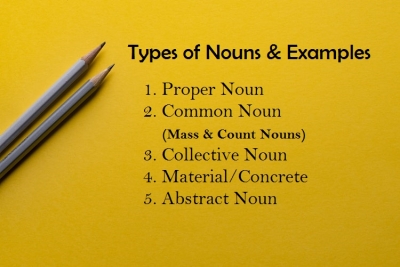
Proper nouns:
Your name is a proper noun. A proper noun is the special word that we use for a person, place or organization, like John, Marie, London, France or Sony. A name is a noun, but a very special noun – a proper noun. English proper nouns have special rules. We always use a Capital Letter for the first letter of a name or proper noun. This includes names of people, places, companies, days of the week and months.
Common nouns:
A noun is a word that names a person, animal, place, thing, or idea. All nouns can be further classified as a proper or common noun. Common nouns are words used to name general items rather than specific ones. Go into your living room. What do you see? A lamp, chair, couch, TV, window, painting, pillow, candle – all of these items are named using common nouns.
Common nouns are everywhere, and you use them all the time, even if you don’t realize it. Wherever you go, you’ll find at least one common noun. Street, closet, bathroom, school, mall, gas station, living room; all of these places are things, and thus they are common nouns.
Collective nouns:
Collective nouns are names for a collection or a number of people or things. Words like group, herd, and array are collective noun examples. Here, we’ll take a closer look at collective nouns, and provide even more examples, placing them in context so you can gain a greater understanding of how they work.
Material nouns:
Material noun is the name given to the material, substance or things made up of alloy. It refers to the type of substance instead of individual particles of the substance. This noun is especially called as material noun because nouns in this class are almost materials like cloth, air, metal, gold, salt, iron, silver, steel, brass, bronze, copper, aluminium, lead, coal, coral, gem, diamond, glass, fibre, calcium, plastic, rubber, paper, cement, paint, plywood, synthetics, shampoo, soap, perfume, wine, tar, chemical, rexene etc. Sometimes we cannot make the plural forms of material noun.
Abstract nouns:
Abstract nouns represent intangible ideas—things you can’t perceive with the five main senses. Words like love, time, beauty, and science are all abstract nouns because you can’t touch them or see them.
Without a tangible frame of reference, abstract nouns can be hard to pin down with grammar rules. In this quick guide, we explain the basics so you can use abstract nouns with confidence!
Do remember
Nouns can be countable or uncountable. Countable nouns are things we can count. They have singular and plural forms. We use articles ‘a’ or ‘an’ with singular countable nouns. We use ‘some, ‘many, and a few with plural countable nouns. To know the number of a countable noun we use how many. Uncountable nouns cannot be counted in number. They include liquids, gases, and other substances and also abstract ideas or qualities.
Here are a few tips
- Some nouns such as sheep, fish, deer, and aircraft have the same singular and plural form.
- The plural forms for daughter-in-law is daughters-in-law; son-in-law is sons-in-law, etc.
- Some uncountable nouns are always singular. Examples: Luggage, baggage, furniture, stationery, information, etc.
- Some uncountable nouns are treated as plural for a singular item. Examples: Spectacles, pants, shorts, scissors, etc.
- Some uncountable nouns are singular but look plural in form. Examples: News, aerobics, crossroads, electronics, etc.
- A little means ‘some but little means ‘hardly any. Examples: There is a little water in the jug. (some water)
- There is little water in the jug. (hardly any water). A few means ‘some but few means hardly any.
- Examples: I have a few friends. (some friends). I have few friends. (hardly any friends)
Picture Credit : Google




